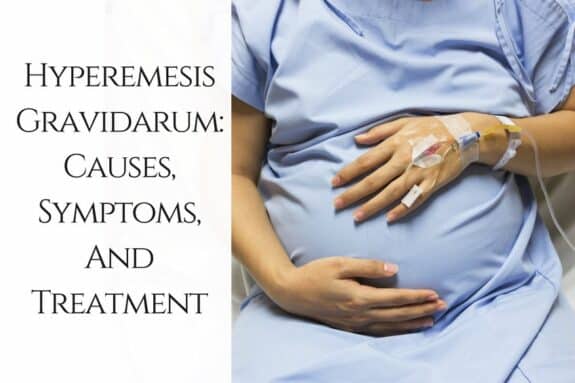Statistics indicate that some 70 to 80 percent of expectant mothers experience some form of morning sickness, but for at least 60,000 women each year (most likely more), the sickness is severe. These soon-to-be moms suffer from a condition known as hyperemesis gravidarum. It typically involves extreme nausea and vomiting, and it can place the mother at risk for dehydration, electrolyte imbalance, and even death. Learn more about this serious but often treatable condition, including its causes, symptoms, and possible treatments.
What Causes Hyperemesis Gravidarum?
Although the exact cause of hyperemesis gravidarum (HG) are unknown, experts believe it may have something to do with the influx of hormones that women experience during pregnancy. There are also a few factors that may increase a woman’s chances of developing HG, such as:
- Being pregnant with multiples,
- A family history of HG,
- Having HG during a previous pregnancy,
- Being overweight,
- Being a fist-time mother, and
- Trophoblastic disease (abnormal cell growth in the uterus).
Signs and Symptoms of Hyperemesis Gravidarum
The signs and symptoms of hyperemesis gravidarum typically surface during the 4- to 6-week gestation period. It may then peak around weeks 9 and 13. Some women do get a little relief during weeks 14 to 20, but this is not always the case. In fact, some 20 percent of women may experience symptoms and complications throughout their entire pregnancy. It should also be noted that the nausea and vomiting experienced with HG often goes above and beyond a simple bout of morning sickness. Instead, it is typically extreme. Other symptoms that may be experienced by mothers with HG can include:
- Food aversions,
- Dehydration,
- Headaches,
- Jaundice,
- Weight loss of more than 5 percent of pre-pregnancy weight,
- Extreme fatigue,
- Fainting,
- Confusion,
- Decreased urination,
- Extreme thirst,
- Loss of skin elasticity,
- Rapid heart rate,
- Low blood pressure, and
- Secondary anxiety/depression.
Risks of Hyperemesis Gravidarum
While morning sickness is unlikely to result in any serious or long-term effects in either mother or baby, HG can be extremely dangerous for both. In babies, the lack of nutrients caused by excessive vomiting may result in:
- Stress to the baby (“fetal programming”),
- Congenital heart disease,
- Premature birth,
- Low birth weight,
- Neural tube defects,
- Hip dysplasia,
- Malformations in the central nervous system,
- Perinatal death,
- Testicular cancer,
- Skeletal malformations,
- Shorter length,
- Skin abnormalities,
- Undescended testicles,
- Large for age weight,
- Neurodevelopmental sequealae, and
- Behavioral/emotional problems as the child ages.
Mothers with HG, who are at risk of dehydration and may be so ill that they cannot care for themselves, can experience some frightening and even life-threatening health complications, including:
- Malnutrition,
- Severe weight loss,
- Fainting spells (which could injure mom or baby),
- Renal failure,
- Easy bruising,
- Heart complications,
- Muscular atrophy,
- Digestive complications,
- Certain neurological conditions,
- Chest pains,
- Damage to the esophagus,
- Central Pontine Myelinolysis (nerve damage to the myelin sheath),
- Jaundice,
- Splenic avulsion (separation of the spleen from its normal location),
- Vasospasms (constricted blood vessels) in the brain,
- Skeletal degeneration,
- Hemorrhaging of the retina,
- Burst blood vessels in the eyes, and
- Severe postpartum depression (PPD).
Treatment for Hyperemesis Gravidarum
Mothers who experience HG must be diligent about watching for signs of dehydration; it poses a real and serious risk to their health, as well as the health of their babies. Any expectant mother that believes she may be suffering from HG should not try to take medication – especially not anything over the counter. Instead, contact your doctor for an appointment. They will discuss with you your symptoms and explain the exact treatment options for your specific situation. Such treatments may include:
- Intravenous fluids to help mothers regain fluids, electrolytes, vitamins, and nutrients;
- Tube feeding to replenish lost nutrients and increase weight;
- Medications to calm some of the nausea and vomiting; and
- Bed rest, particularly at times when HG is most severe.
Some HG sufferers also experience some relief through homeopathic and alternative medicine options, such as herbal remedies, acupuncture, and essential oils. However, it is important to note that these methods are not backed by science, and some could pose a risk to either mother or baby. Please consult with your doctor before trying a homeopathic or alternative option.







